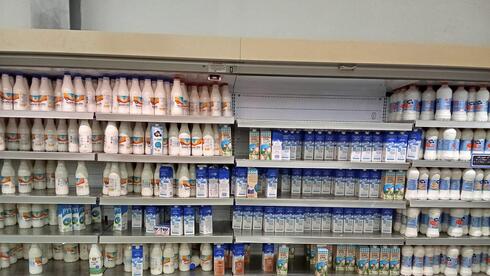It will take at least two months before milk imports begin, meaning store shelves could remain empty in the meantime, a review by Ynet found.
The Israel Dairy Board opposes the move, saying it is a broad, symbolic step that fails to address the specific shortage expected during the upcoming High Holidays.
Finance Minister Bezalel Smotrich signed an order last week allowing customs-free milk imports, but the shortage forecast for the Tishrei holidays, which begin in about a month, is not expected to ease.
The shortage stems from dairy plants halting production for nine days in observance of kosher requirements during the holiday period.
Conversations with importers revealed that it will take at least two months for the imports to arrive, leaving shelves nearly bare in the meantime.
The Agriculture Ministry had asked the Finance Ministry to permit a limited import of six million liters of milk only for the holiday season, but Smotrich instead signed an order allowing an unrestricted amount of milk imports for six months.
Rami Levy and Zvika Williger, co-owners of Willi-Food-Euro Dairies, said it would take at least six to eight weeks to prepare. With the holidays beginning at the end of next month, the shipments will not arrive in time.
Levy, who is preparing to import milk from Poland, said: “It will take us at least a month and a half.”
Williger, who is planning imports from a Western European country, added: “It takes about two months to prepare packaging, design and finalize contracts with the dairy. It will not happen until after the holidays.”
Williger noted that importing milk is barely profitable even after the tariff reduction, calling the move more symbolic than practical.
For him, milk is a complementary product to offer customers, such as cafés, restaurants and supermarket chains, alongside cheeses and other dairy products.
Levy added: “What I gained from importing milk was the customer I served, who didn’t suffer from a shortage.”
The shortage consumers face applies only to price-controlled milk, as dairies prefer to produce enriched milk with a higher retail price at the expense of the regulated product.
In addition, Smotrich’s order does not require importers or retailers to sell the imported milk at the regulated price. Some importers said they intend to bring in higher-quality milk with 3.5% fat, which is not subject to price controls.
The order is not final and is still subject to a public hearing.
The Israel Dairy Board and Israeli Cattle Breeders’ Association (ICBA), which represents dairy farmers, strongly oppose the measure, arguing that the order permits imports for six months instead of just during the holiday period, when the shortage is expected.




